
Pinochle, also called pinocle or penuchle, is a trick-taking, Ace-Ten card game typically for two to four players and played with a 48-card deck. It is derived from the card game bezique; players score points by trick-taking and also by forming combinations of cards into melds. It is thus considered part of a "trick-and-meld" category which also includes the game belote. Each hand is played in three phases: bidding, melds, and tricks. The standard game today is called "partnership auction pinochle".
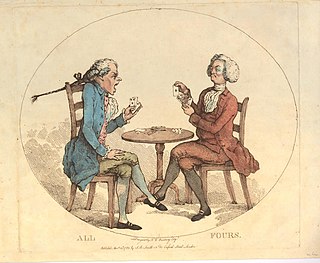
All Fours is a traditional English card game, once popular in pubs and taverns as well as among the gentry, that flourished as a gambling game until the end of the 19th century. It is a trick-taking card game that was originally designed for two players, but developed variants for more players. According to Cotton, the game originated in Kent, but spread to the whole of England and eventually abroad. It is the eponymous and earliest recorded game of a family that flourished most in 19th century North America and whose progeny include Pitch, Pedro and Cinch, games that even competed with Poker and Euchre. Nowadays the original game is especially popular in Trinidad and Tobago, but regional variants have also survived in England. The game's "great mark of distinction" is that it gave the name 'Jack' to the card previously known as the Knave.

Black Lady is an American card game of the Hearts group for three to six players and the most popular of the group. It emerged in the early 20th century as an elaboration of Hearts initially also called Discard Hearts, and is named after its highest penalty card, the Queen of Spades or Black Lady. It is a trick-avoidance game in which the aim is to avoid taking tricks containing hearts or the Black Lady. Culbertson describes it as "essentially Hearts with the addition of the queen of spades as a minus card, counting thirteen" and goes on to say that "Black Lady and its elaborations have completely overshadowed the original Hearts in popularity."

Spades is a trick-taking card game devised in the United States in the 1930s. It can be played as either a partnership or solo/"cutthroat" game. The object is to take the number of tricks that were bid before play of the hand began. Spades is a descendant of the Whist family of card games, which also includes Bridge, Hearts, and Oh Hell. Its major difference as compared to other Whist variants is that, instead of trump being decided by the highest bidder or at random, the Spade suit always trumps, hence the name.

Big two, is a card game of Chinese origin. It is similar to the games of winner, daifugō, president, crazy eights, cheat, and other shedding games. The game is very popular in East Asia, and in Southeast Asia, especially throughout mainland China, Hong Kong, Macau, Taiwan, Indonesia, Malaysia and Singapore. It is played both casually and as a gambling game. It is usually played with two to four players, the entire deck being dealt out in either case. The objective of the game is to be the first to play of all of one's cards.
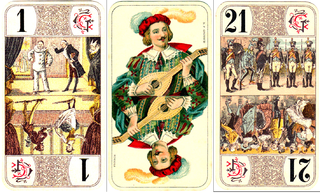
The game of French Tarot, also jeu de tarot, is a trick-taking strategy tarot card game played by three to five players using a traditional 78-card tarot deck. The game is the second most popular card game in France and is also known in French-speaking Canada.
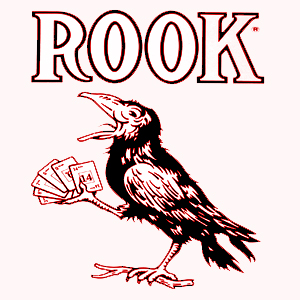
Rook is a trick-taking game, usually played with a specialized deck of cards. Sometimes referred to as Christian cards or missionary cards, Rook playing cards were introduced by Parker Brothers in 1906 to provide an alternative to standard playing cards for those in the Puritan tradition or Mennonite culture who considered the face cards in a regular deck inappropriate because of their association with gambling and cartomancy.

Golf is a card game where players try to earn the lowest number of points over the course of nine deals.
Pedreaux is an American trick-taking card game of the All Fours family based on Auction Pitch. Its most popular variant is known as Cinch, Double Pedro or High Five. Developed in Denver, Colorado, in the 1880s, it was soon regarded as the most important member of the All Fours family. Although it went out of fashion with the rise of Auction Bridge, it is still widely played on the western coast of the United States and in its southern states, being the dominant game in some locations in Louisiana. Forms of the game have been reported from Nicaragua, the Azores, Italy and Finland. The game is primarily played by four players in fixed partnerships, but can also be played by 2–6 individual players.
Pitch is an American trick-taking card game derived from the English game of All Fours. Historically, Pitch started as "Blind All Fours", a very simple All Fours variant that is still played in England as a pub game. The modern game involving a bidding phase and setting back a party's score if the bid is not reached came up in the middle of the 19th century and is more precisely known as Auction Pitch or Setback. Whereas All Fours started as a two-player game, Pitch is most popular for three to five players. Four can play individually or in fixed partnerships, depending in part on regional preferences. Auction Pitch is played in numerous variations that vary the deck used, provide methods for improving players hands, or expand the scoring system. Some of these variants gave rise to a new game known as Pedro or Cinch.
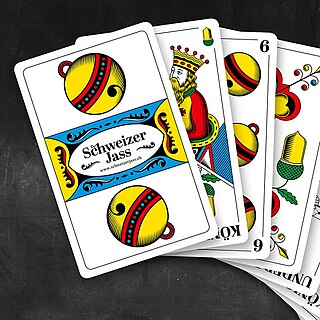
Jass is a trick taking, Ace-Ten card game and a distinctive branch of the Marriage family. It is popular throughout the Alemannic German-speaking area of Europe (German-speaking Switzerland, Liechtenstein, Alsace part of France, Vorarlberg province of Austria, southwestern Germany, as well as in Romansh-speaking Graubünden and the French-speaking area of Switzerland, German-speaking South Tyrol in Italy, and in a couple of places in Wisconsin, USA.
Sueca is a 4 player-partnership point trick-taking card game of the Ace-Ten family, and a popular variant of the Bisca card game. The game is played in Portugal, Brazil, Angola and other Portuguese communities. Its closest relative is the very similar German game Einwerfen.
Shelem, also called Rok or similar, is an Iranian trick-taking card game with four players in two partnerships, bidding and competing against each other. It is similar to Spades and Hokm, but bidding and trump are declared in every hand by the bidding winner. Both the name and the point structure of this game are similar to the American game Rook, there being a possible connection between the two games, although it is not clear as from which game it derives.
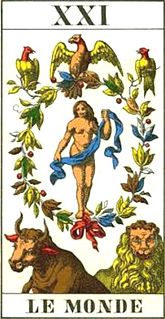
Troccas is a member of the Tarot family of card games. It is played in the Romansh speaking part of the canton Grisons of Switzerland. It is not known exactly how this game entered Switzerland but it is generally thought to have arrived from Italy during the 17th century.
Smear is a North-American trick-taking card game of the All Fours group, and a variant of Pitch (Setback). Several slightly different versions are played in the Upper Peninsula of Michigan, Minnesota, Northern and Central Iowa, Wisconsin and also in Ontario, Canada.

Watten, regionally also called Watteln or Wattlung, is a card game that is mainly played in Bavaria, Austria, Switzerland and South Tyrol. There are several main variants: Bavarian, Bohemian, South Tyrolean (Stichwatten), (Austrian) Tyrolean, Kritisch and Blind Watten. It is usually a 4-player game, which is "by far the most interesting", but it may also be played by 2 or 3 players. Parlett says that "though hard to describe, Watten is fun to play and easy to learn."

Voormsi or Vorms is a Greenlandic trick-taking card game of the Brusbart family designed for four players. The game is "reputed to be ancient", possibly dating to the Whaling Period before 1721.
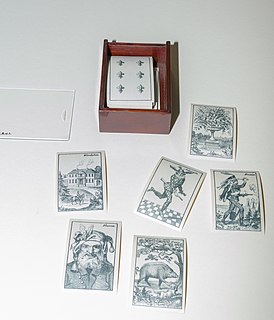
Kille, also called Cambio, Campio, Kambio or Kamfio, is a game played with special playing cards, dating from a mediaeval French gambling game. In Sweden, the game had its heyday during the 1750s, but it is one of the oldest card games still played.
Cucumber is a north European card game of Swedish origin for two or more players. The goal of the game is to avoid taking the last trick. David Parlett describes it as a "delightful Baltic gambling game".

Femkortskille, also called Knackkille or Bultkille, is a Swedish card game that is played with a Kille pack. The game originated in the middle of the 19th century by transferring the principles of the game of Femkort to a game played with Kille playing cards. Like Kille, Femkortskille is traditionally played for money.













